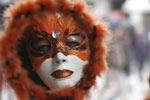Government and Policy
Health action targets high intake of salt, oil
Updated: 2011-03-10 07:57
By Wu Wencong (China Daily)
|
Zhu Ling, a resident of Shaoyaoju residential community, plays table tennis at Heping Jie in Chaoyang district on Wednesday. Liu zhe / China Daily |
Guidelines aim to change habits of citizens, raise life expectancy
Beijingers are being urged to halve their daily intake of salt and oil as part of draft guidelines aimed at getting residents to live healthier lifestyles.
Statistics released by the capital's health bureau show the average citizen eats the equivalent of more than 54 grams of oil every day, roughly double the recommended level. Average daily salt consumption is 13.4 grams, compared to a suggested amount of just 6 grams.
"A high oil and salt diet is typical of people's lifestyle in Beijing, but it could increase the possibilities of obesity, heart disease and hypertension," said Zhu Huadong, deputy chief physician of emergency medicine at Peking Union Medical College Hospital.
"If citizens reduce their daily salt and oil intake to the suggested levels, the average life expectancy in Beijing may rise by several years."
The average life expectancy now is 80.47 years old, according to official figures for 2009.
Zhao Chunhui, deputy director of the capital's health bureau, said salt dealers have been asked to include a
2-gram measuring spoon with each bag sold, while a oilcan for cooking has been given to families in each community.
"We're also promoting low oil and low salt in canteens and restaurants," said Zhao, "but people's tastes are hard to change."
Setting a limit on salt and oil intake is part of the bureau's 34-item guidelines, which have been released following repeated calls by experts in public health, epidemic disease, psychology and sociology to provide a reference for citizens to improve their quality of life.
The guidelines, which are targeted at 18- and 60-year-olds, fall in three categories: healthy behavior and lifestyle, such as suggestions on exercises, diets, smoking, drinking and sleeping; psychology, and indicators to measure the basic health condition of a person, such as body mass index and blood pressure.
Zhu at Peking Union said that, judging by his experience, citizens in Beijing are thirsty for health knowledge, "yet they prefer folk prescriptions, which is a medicine or activity that is recommended to cure most illnesses".
"A real expert is very careful with such suggestions because there's no absolute in medical science," he said, before adding that he hopes the guideline will help people follow the right suggestions to maintain a healthy condition.
Apart from the bureau's health campaign, a project is also under way to authenticate all the medical experts in Beijing, according to an official from the Beijing Association of Health Education on Wednesday.
The guidelines can be downloaded from the official website of the health bureau, bjhb.gov.cn, and is open for comments until March 25.
After being reviewed by the public, a final draft version will be released and sent to citizens with details of each item in a bid to help people achieve their healthy goals.
To comment, e-mail metrobeijing@chinadaily.com.cn.
China Daily
(China Daily 03/10/2011)
Specials

NPC & CPPCC sessions
Lawmakers and political advisers gather in Beijing to discuss major issues.

Self-made aircraft
An automobile mechanic in Northeast China made a test flight of his self-made aircraft which cost about US$395.

Venetian Carnival
Masked revellers celebrate in Saint Mark's Square in Venice.
